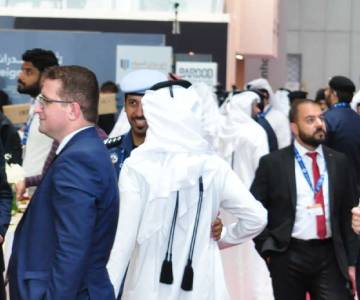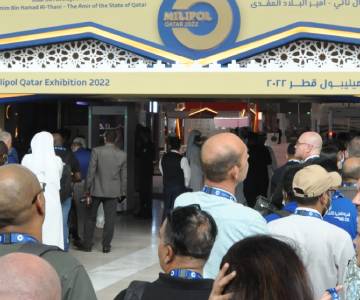Tuesday 29 October
How to Secure Ports, Airports and Borders?
- 14:30 -
15:00
A homeland security military Air Force, for what purpose?
- Colonel Eric ESPINAL, French National Gendarmerie Air Forces Deputy Commander
For 70 years, the French National Gendarmerie has been operating military aerial means to protect citizen in its daily missions as well as crisis and emergency context. Through its organization, its staff and technical resources, it has continued to evolve to always meet the needs of the homeland security forces.
- 15:00 -
16:00
Transforming Law Enforcement with Digital and Mobile Biometric Solutions
- Hadi HUSSANT, General manager (Oman Branch) & VP Sales Middle East Region, IDEMIA
Explore the latest advancements in digital biometrics designed to modernize policing and streamline criminal identification and investigative processes. Discover how our mobile enrollment and identity verification solutions enable law enforcement agencies to conduct these processes anywhere—from major law enforcement stations to smaller outposts, on the road, and even during sensitive crime scene interventions—thereby democratizing access to advanced digital tools for all officers and enhancing community protection.
- 16:00 - 16:30 Enabling Intelligence-Led Border Protection
- Mr Hong-Eng KOH, Global Chief Public Services Industry Scientist, Huawei
Wednesday 30 October
Fire and Rescue
- 10:30 -
11:30
Civil Defence New Adopted Technical Requirements Guide
- Lieutenant Engineer Hissa Ahmed AL-JASSIM, General Directorate of Civil Defence, Qatar
In cooperation with government agencies and the private sector represented by consulting offices and by reviewing the requirements published by the National Fire Protection Association, work was carried out to prepare and publish two versions of the Civil Defence Technical Requirements Guide in Arabic and English, with the Arabic version including three main sections. The first section includes some technical terms specific to the General Administration of Civil Defence, and the second section contains all the elements relating to fire and life safety, broken down by type of occupation. The third and final section contains fire and life safety requirements (appendix) and details of the requirements for ventilation, fire extinguishing and alarm systems used in the building. In contrast, the English version contains only two main sections, the fire and life safety requirements and the appendix.
- 12:30 -
13:30 The Guideline for Good Practice, Safe Storage, and Handling of Hazardous Chemicals
- Captain Engineer Mohamed Talal AL-MARRI, HAZMAT Branch, Committee Member, the Institution of Chemical Engineers (IChemE), Qatar
The "Guideline for Good Practice, Safe Storage, and Handling of Hazardous Chemicals" is a valuable resource for assisting small and medium-sized enterprises as well as students and professionals in the field of hazardous materials. This book aims to provide comprehensive guidelines on how to safely store hazardous materials and ensure proper handling to protect human health and the environment from fires.
- 16:00 - 17:00 Requirements of Buildings and Existing Historical Facilities
- Captain Engineer Khalid Mohammed AL-OBAIDLI, General Directorate of Civil Defence, Qatar
Given the General Directorate of Civil Defence's desire to facilitate the problems faced by existing buildings and facilities in the country in terms of their inability to meet certain requirements, which constitutes a major architectural challenge for these buildings and facilities, the General Directorate of Civil Defence was keen to form a technical committee to define requirements and alternatives to architectural issues. The most common problems facing these buildings were examined by gathering data and problems relating to these types of facilities. Numerous meetings were held and several alternatives were proposed, and what was most appropriate and worthy for these buildings was chosen.
- 17:30 - 18:30 The GCC Civil Defence Maps the Infrastructure of Fire Safety: QCD
- Sawsan DAHHAM, CEO and Founder of SIENA, Specialist Engineering Consultancy, Lebanon
During the past decade, the Gulf Cooperation Council (GCC) area, has witnessed an increased awareness in the Fire and Life Safety industry, following several major reasons. Local authorities worked hard on improving the quality of preventive and protective measures in case of a fire event in their cities and enhancing the portfolio of their Authorities Having Jurisdiction (AHJ), referred to as Civil Defence (CD).
Qatar creates an interesting case study to reflect the effective development of Civil Defence Authority and their continuous commitment to safety to life and similar danger, within the past decade.
Thursday 31 October
Cybersecurity & Cyberthreats: Protecting Digital Space
- 10:00 - 10:45 Cyber Threats
- Badr AL-SADA, Assistant Director of Cyber Threat Department, National Cyber Security Agency
Cyber threats to next-generation systems and technology. The constant acceleration of the expansion of the attack surface and the acceleration of digitisation and its impact on the lives of people and national infrastructures From satellite systems to Internet of Things (IoT) systems to the adoption of Artificial Intelligence (AI) systems In general, these matters are explained from the point of view of cyber risks and ways to deal with them and prioritise them.
- 10:45 - 11:30 Ensuring Cyber-sovereignty Towards An Intelligent Digital Future
- Dr. Aloysius CHEANG, Chief Security Officer, Huawei Middle East & Central Asia Region
- 11:30 - 12:00 Strategies for Enhancing Cyber Security in Criticial Infrastructure
- Fatima Abdullah AL KHULAIFI, National Cyber Governance and Assurance Affairs, National Cyber Security Agency
- Al Maha Mohammed AL BUAINAIN, National Cyber Governance and Assurance Affairs, National Cyber Security Agency
Discuss effective strategies, methods and initiatives to protect critical infrastructure from increasing cyber threats to industrial control systems. The session focuses on the importance of cooperation between different sectors to ensure continuity of operations in critical functions.
- 13:00 - 14:00 Securing Cyber Space during Mega Events
- Ahmad AL-BINALI, Cyber Enablement Department, National Cyber Security Agency
The presentation will look at how to secure major events in Qatar in terms of their importance and the importance of cybersecurity for major events.
- 16:00 - 17:00 National Cyber Drill
- Hamad AL-KHATER, National Cyber Program Delivery, National Cyber Security Agency
- AlJazi AL-BOENAIN, National Cyber Program Delivery, National Cyber Security Agency
An overview of the National Cyber Drill, the importance of implementing it periodically and the benefits resulting from it, in addition to presenting scenarios of the latest version and the best ways to respond to them The lecture will include interactive Q&A with the audience during the explanation and presentation of the scenarios.



